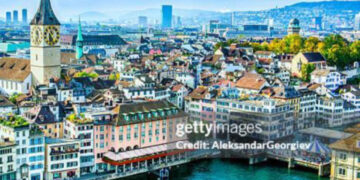Tourists in Copenhagen who participate in eco-friendly activities such as litter picking or using public transport may receive rewards including free food, cultural experiences, and tours as part of a novel pilot program.
The CopenPay trial, running from today, July 15 to August 11, is focused on “transforming green actions into currency for cultural experiences,” according to a statement from the city’s tourism authority, Visit Copenhagen, also known as Wonderful Copenhagen, released on Monday.
For instance, visitors who bring plastic waste to the National Gallery of Denmark will be allowed into a workshop to convert it into artwork, and those who bike or use public transport to reach the city’s renowned heating plant can ski down its artificial rooftop slope.
“CopenPay rewards actions such as cycling, participating in cleanup efforts, or volunteering at urban farms with access to a variety of enriching experiences and everyday wonders of Copenhagen. This includes complimentary guided museum tours, free kayak rentals, and even a free vegetarian lunch made from local crops,” the Wonderful Copenhagen statement further explained.
Copenhagen is beloved for its attractive architecture, superior cuisine, and its clean, safe, green surroundings.
The city is ideal for biking, boasting 382 kilometers (237 miles) of bike lanes, with 62% of all citizens commuting by bike, as reported by the tourism board.
“With CopenPay, we’re empowering people to experience more of what Copenhagen offers while placing less burden on our planet,” Mikkel Aarø Hansen, CEO of Wonderful Copenhagen, declared in a statement. “It’s about creating meaningful and memorable experiences that are enjoyable and environmentally responsible.”
Rewards might be offered when visitors display a public transport ticket, though the system principally relies on trust.
An online map indicates over 20 venues participating in the trial. If successful, the pilot project could become a permanent program.
This program launches during a period of heightened concern about the environmental and social impacts of tourism, as evidenced by recent protests in places like Barcelona, the Canary Islands, and Mallorca.
“We must turn tourism from being an environmental burden into a force for positive change, and one important step in this transformation is to change how we move around on the destination, what we consume, and how we interact with the locals,” Hansen emphasized in the Wonderful Copenhagen press release.

























































